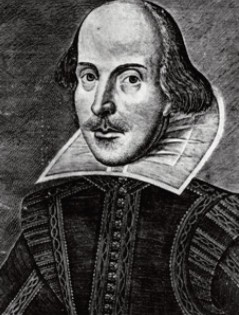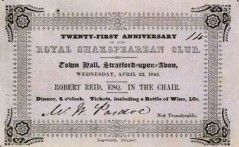  |
|
PROGRAMME DETAILS FOR THE 189TH SEASON 2012/2013
TUESDAY 9 October 2012
Patrick Spottiswoode
Globe Theatre

Patrick Spottiswoode joined Shakespeare’s Globe in 1984 and became founding Director, Globe Education in 1989. In 1995 he initiated a 30 year project to stage readings and record all surviving plays by Shakespeare’s contemporaries. Other projects include the first Globe MA in Shakespeare’s Studies with King’s College London, a two year programme of events celebrating Shakespeare and Islam and, more recently, a Shakespeare is German series of events including the launch of a book of translations, Goethe on Shakespeare, which Patrick commissioned. Patrick is currently President of the Shakespeare Theatre Association. This summer he received an Honorary PhD from Warwick University and an Honorary Fellowship from King’s College London.
"Why Didn't Shakespeare Give Me More Rhymes"
Rhyming Couplets: Did Shakespeare Have An End In Mind?
Lecture Notes
The 872nd meeting of the Shakespeare Club took place at Mason Croft on Tuesday 11 September 2012. The meeting was chaired by Lady Deborah Follett who introduced Patrick Spottiswode, Director of Globe Education, whose subject was ‘"Why Didn't Shakespeare Give Me More Rhymes": Rhyming Couplets: Did Shakespeare Have An End In Mind?’.
Mr Spottiswoode set the scene with an overview of a literary debate about the role of rhyme between poets Samuel Daniel and Thomas Campion in the first years of the 1600s. Campion argued for a sparing use of rhyme, while Daniel, appointed Poet Laureate in 1599, himself wrote in rhyme and defended its use while criticising blank verse for ‘running on’. Having set himself the task of reading all the plays written in England in Elizabeth’s reign in the last year, Mr Spottiswoode reported that all were in rhyme until Gorboduc, which experimented with blank verse, and Supposes the first English prose comedy. Turning to Shakespeare he noted that he employed a variety of verse forms selected for dramatic effect, with the most common being rhyming iambic pentameters, and then asked the audience to estimate the number of rhyming couplets in the plays. Richard Morris came nearest to the correct answer, 3352. The highest number in a single play was in Love’s Labour’s Lost with a significant use in the plays of Shakespeare’s mid career.
Mr Spottiswoode focussed on two uses for couplets - leaving and loving - with a prodigious display of statistics. For example of the 821 scenes in Shakespeare’s plays, 379 end in rhyming couplets, 223 in prose and 219 in blank verse. He gave examples of rhyme in death speeches and to mark delayed exits. Turning to love, he spoke of the cliché of the rhyming lover in Shakespeare’s time, and proceeded to demonstrate how the playwright used shared sonnets in Romeo and Juliet to bind the young lovers.
After questions and an enthusiastic vote of thanks for a witty and erudite talk, the meeting closed at 9pm
CLICK TO GO BACK TO MAIN PROGRAMME LIST
|




